|
Big Beasts
Whilst the entire staff of Shots swanned off across the Atlantic for a burst of St Louis Blues at Bouchercon, I was left holding the editorial fort and immediately allowed myself to be treated to a candle-lit luncheon in a cosy little restaurant within sight of Broadcasting House in the company of two of publishing’s leading ladies. As we were broaching that elusive third bottle, the table talk gravitated towards how well crime and thriller fiction was about to do in the bestseller lists over the next month, and I have to say: we had a point.
It seems that all the big beasts of thrillerdom are gathering at the watering hole of the bestseller lists at once (you’ll see the reason for the imagery later), or at least threatening to dominate it between now and November.
First up is a guaranteed bestseller (or I’m not the manager of Aston Villa), Lee Child’s “prequel” thriller The Affair, out from Bantam just about now, which is a Jack Reacher tale set (in 1997) six months before the first Jack Reacher thriller, if you see what I mean.
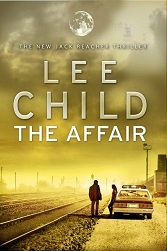
And then in rapid succession, Martina Cole releases her latest addictive novel The Faithless, from Headline, on to her already-huge fan base over a staggering 162 Chapters (plus Epilogue).
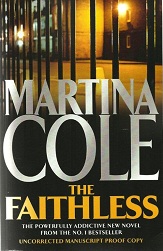
Shortly after, with hardly time to draw breath, Ian Rankin and publisher Orion launch The Impossible Dead, the second of his post-Rebus thrillers featuring Internal Affairs cop Malcolm Fox.
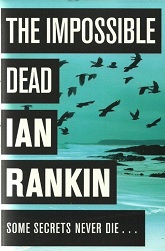
The setting may still be Edinburgh and both Rebus and Fox are dour Scots, but there is of course a basic difference between them. As a teetotaller, Fox knows that when he wakes up in the morning, that’s as good as he’s going to feel all day.
Towards the end of October, Orion also publish the latest novel by the American master of the police procedural Michael Connelly, although the title, The Drop, sounds 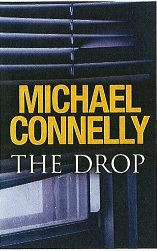 perhaps more ominous than it should. Lest any of his fans fear for the future of Connelly’s brilliant police detective Harry Bosch, I should explain that “The Drop” refers not to some Reichenbach-like fall, but to the LAPD’s Deferred Retirement Option Plan, which we are assured gives Harry another three years of solving cold cases and avoiding his politician enemies. If, that is, he gets through the multiple cases he faces in The Drop, which include a politically sensitive “suicide” very much in the present and an old case re-opened when new DNA techniques identify a rapist-murderer from 1989 – the only trouble being that the DNA trace belongs to a suspect who would have been eight years old at the time of the crime! The Drop is a master-class of plotting; Bosch is a great character (one I have been following since 1994 and I have rarely been disappointed); and Connelly is writing at the peak of his powers, making it look easy. perhaps more ominous than it should. Lest any of his fans fear for the future of Connelly’s brilliant police detective Harry Bosch, I should explain that “The Drop” refers not to some Reichenbach-like fall, but to the LAPD’s Deferred Retirement Option Plan, which we are assured gives Harry another three years of solving cold cases and avoiding his politician enemies. If, that is, he gets through the multiple cases he faces in The Drop, which include a politically sensitive “suicide” very much in the present and an old case re-opened when new DNA techniques identify a rapist-murderer from 1989 – the only trouble being that the DNA trace belongs to a suspect who would have been eight years old at the time of the crime! The Drop is a master-class of plotting; Bosch is a great character (one I have been following since 1994 and I have rarely been disappointed); and Connelly is writing at the peak of his powers, making it look easy.
With still a week to go to Halloween, that Mississippi legal maestro John Grisham drops a new blockbuster on us, The Litigators, via publishers Hodder who have imposed such a strict pre-publication embargo (enforced by the crack troops of their publicity department) that all I can tell you about it is that it’s a legal thriller and will probably sell rather well.
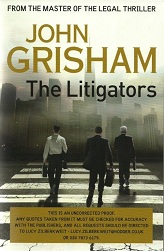
And as we move into the first week of November, Peter James and publishers Macmillan, launch Perfect People, a stand-alone thriller rather than one of his successful Roy Grace series. Peter James is closely associated with the south coast resort of Brighton and indeed his crime novels set there have spawned several imitators, yet although we now think of Peter James as synonymous with Brighton, less than ten years ago in 2002, neither he nor his hero Roy Grace merited a mention in the otherwise exemplary guide Scene of the Crime by Julian Earwaker and Kathleen Becker. This is probably due to Roy Grace not making his debut in print until 2005. To have a hero so well-entrenched in the crime fiction pantheon in such as relatively short period of time is quite a remarkable achievement.

And speaking of well-entrenched fictional detectives (possibly the biggest of those beasts), the long-awaited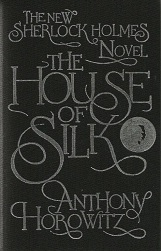 “officially sanctioned” new Sherlock Holmes novel, The House of Silk by Anthony Horowitz is published by Orion on November 1st. No doubt there will be some carping by die-hard Sherlockians – the same mugwumps who railed against recent reincarnations by Robert Downey Jnr and Benedict Cumberbatch (both of whom gave excellent, highly entertaining performances in my not-so-humble opinion) – but I refuse to give their shrill ravings the helium of publicity. As far as I can see, Anthony Horowitz has done a thoroughly professional job and reading the novel felt to me like being in the company of an old and distinguished friend – or should that be two old friends? “officially sanctioned” new Sherlock Holmes novel, The House of Silk by Anthony Horowitz is published by Orion on November 1st. No doubt there will be some carping by die-hard Sherlockians – the same mugwumps who railed against recent reincarnations by Robert Downey Jnr and Benedict Cumberbatch (both of whom gave excellent, highly entertaining performances in my not-so-humble opinion) – but I refuse to give their shrill ravings the helium of publicity. As far as I can see, Anthony Horowitz has done a thoroughly professional job and reading the novel felt to me like being in the company of an old and distinguished friend – or should that be two old friends?
Finally some big beasts; literally.
Some years ago I was notably impressed by a paperback original entitled African Sky, published here (I think) by Pan, a wartime thriller set in Rhodesia by one Tony Park. For four years (and probably legal reasons) I heard no more of Tony Park until, curiously, his name came up in correspondence with a distinguished crime fiction reviewer in Australia, who recommended some of Tony Parks’ books. Before I had chance to thank my colonial correspondent for his suggestion, an advance copy of Tony Parks’ latest novel, African Dawn, to be published by Quercus in November, dropped through the letter box.
Although an Australian, Tony Park is clearly smitten with African history, topography and environment and has put his enthusiasm to good use and on an epic scale as African Dawn opens in Southern Rhodesia in 1959 and spans fifty years of family history and the political struggle to create the new country of Zimbabwe, all counterpointed against the plight of the endangered black rhino. (The ‘big beast’ –geddit?)
As South African crime fiction has blossomed and boomed, the African adventure thriller has remained solidly the preserve of Wilbur Smith – until now. Tony Parks is a worthy rival and, perhaps ominously, was born in the year Wilbur Smith published his first blockbuster, When the Lion Feeds.
Less a duty, more a pleasure
It is a long-standing custom of mine to re-read a Margery Allingham novel whenever there is a pending event organised by that noble institution The Margery Allingham Society. This tradition began as a self-defence mechanism as the members of the Society are frighteningly well informed on the works of one of the true ‘Queens of Crime’ and although I have read all her novels at least twice, it always pays to refresh one’s memory . This year, in advance of the Society’s September meeting, my choice for a bit of Allingham ‘revision’ was her 1934 novel Death of a Ghost, which I know was a personal favourite of my old friend, the late Harry Keating.
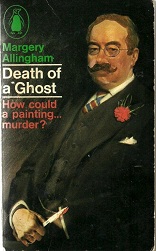 It is some years since I last read the book – about 45 if truth be known – but I still found much in there to enjoy, admire and chuckle at. It is set in the ‘art world’ and most of the action happens in west London but for one chapter towards the end, when Allingham sends her detective hero (the immaculate Albert Campion) out into the country, to the village of ‘Heronhoe’ which ‘is in that part of Essex which is almost Suffolk’. I had almost forgotten the scene – which proved that Margery was far more at home in the countryside than the town – between Campion and ‘Mr Pudney’ the irascible landlord of The White Lion public house, who rails so convincingly (a good forty years before Basil Fawlty) against the iniquities of having to be nice to customers in general but in particular having to put up with the passing tourist trade, or “trippers” as he calls them. There are many different sorts of “trippers”, of course, but one particular sort is beyond the pale. ‘But we don’t tolerate common trippers from London. The village boys set the dogs on them.’ It is some years since I last read the book – about 45 if truth be known – but I still found much in there to enjoy, admire and chuckle at. It is set in the ‘art world’ and most of the action happens in west London but for one chapter towards the end, when Allingham sends her detective hero (the immaculate Albert Campion) out into the country, to the village of ‘Heronhoe’ which ‘is in that part of Essex which is almost Suffolk’. I had almost forgotten the scene – which proved that Margery was far more at home in the countryside than the town – between Campion and ‘Mr Pudney’ the irascible landlord of The White Lion public house, who rails so convincingly (a good forty years before Basil Fawlty) against the iniquities of having to be nice to customers in general but in particular having to put up with the passing tourist trade, or “trippers” as he calls them. There are many different sorts of “trippers”, of course, but one particular sort is beyond the pale. ‘But we don’t tolerate common trippers from London. The village boys set the dogs on them.’
I had forgotten, until so reminded, that I had first learned this excellent advice from a Margery Allingham book; advice which is now enshrined as a warning notice on the gates of Ripster Hall.
The event, by the way, was an excellent meeting in the village of Tolleshunt D’Arcy – Margery’s Essex home – where David Cleveland of the East Anglian Film Archive showed a selection of restored home movies from the 1950s made by Margery’s sister Joyce, an accomplished amateur film-maker.
Lectures, Sermons, Lessons
Baroness Eliza Manningham-Buller, the former Chief Spook at MI5, was a clever choice to give the Reith Lectures and in doing so, she reminded me that I must start preparing my traditional Christmas Eve sermon. This year I intend to tackle the thorny question: What did old thrillers ever do for us? But so as not to be too intellectual for my audience (mostly yokels, estate workers and the below-stairs staff) I will refine and personalise the topic to: What did old thrillers ever teach me?
The short answer I suppose is many things, but I will arrange my sermon by topic and the first subject which springs to mind is Geography, for in my youth, thrillers provided a personal atlas of adventure and globe-trotting could be done for the cost of a 3/6d paperback (17.5p in new money). My profound knowledge of Antarctica I owe to Hammond Innes; of Greenland to Alistair Maclean; of the Namib Desert to Geoffrey Jenkins; and then there was the crash course in Tibet and the Himalayas provided by three books: Berkeley Mather’s The Pass Beyond Kashmir (1960), Lionel Davidson’s The Rose of Tibet (1962) and Derek Lambert’s The Kites of War (1969).
  
Whilst I believe Rose of Tibet is still in print, I think it is a long time since either of the other two were, which is slightly sad. Berkley Mather, after a career in the Indian army, certainly knew his stuff and Pass Beyond Kashmir was something of an iconic title in its day, much praised by Ian Fleming. (And Mather went on to work as what we would now call a ‘script doctor’ on the film Dr No). Derek Lambert, as a journalist, covered the Sino-Indian war of 1962 and went on to write two dozen popular thrillers, probably the best known of which was The Yermakov Transfer in 1974. Lambert retired to Spain, where he died in 2001, one of a long line of journalists, which included Alan Williams, Duncan Kyle, Gavin Lyall and Freddie Forsyth, who turned their hand to thriller writing in the 1960s and 70s and gave great entertainment – and educational – value.
In other portions of my sermon I will be looking at how thrillers enhanced my GCE curriculum when it came to domestic science, politics, languages, history and, of course, sex.
Gone but not quite forgotten
Speaking of old thrillers, which I often do, am I the only one who remembers the adventures of British private eye Mark Raeburn, as created by Malcolm Gair in the early 1960s?
 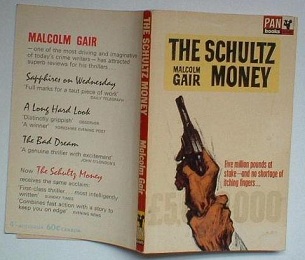
‘Malcolm Gair’ was the pen-name used for crime fiction by novelist John Dick Scott (1917-1980), who was at one point the Literary Editor of the Spectator and in 1944 was appointed an official war historian by Churchill’s Cabinet Office. I think there were half-a-dozen Mark Raeburn adventures in total and I was drawn to them by the fact that British, as opposed to American, private eyes were something of a rarity in my experience. I can think of only Victor Canning’s creation Rex Carver, as well as Gair’s Raeburn offering any sort of competition to the Travis McGees, Lew Archers and Mike Hammers of the time, but sadly, ‘Malcolm Gair’ seems to have slipped off the radar completely as I have never seen a reference to him in even the most comprehensive ‘encyclopedias’ of the genre.
Errors and Omissions
The eagle-eyed among my reader noticed the unforgiveable error in last month’s column when I attributed the film tie-in edition of John le Carré’s brilliant novel Tinker Tailor Soldier Spy to a publisher who wasn’t actually Sceptre, who should take any and all credit due. The particular piece of misinformation which did appear was apparently the work of a mole placed in deep cover among the Shots Magazine typesetters many years ago when anyone perceived as having an interest in crime fiction was ripe for recruitment by: (a) international Marxism, (b) the CIA or (c) the Romantic Novelists Association. [Delete as appropriate.]
By now, as ‘the public’ have been allowed in to see the film, I can say that I was highly impressed with it as a piece of cinema. As John le Carré himself has said, don’t think of it as ‘the film of the book’ and certainly not as ‘the film of the TV series’ but as ‘the film of the film’ which are very wise words, as most of Le Carré’s words are.
Old Friends Always Welcome
I had always considered myself well-read in the works of American legend Rex Stout and have spent many happy hours in the company of his superb crime-fighting creations Nero Wolfe and Archie Goodwin. Although I own 22 Wolfe novels I realised that this was only about half of Stout’s output over a long and prolific career – his first book was published in 1913 (Nero Wolfe debuting in 1934) and his last in 1975, the year of his death.
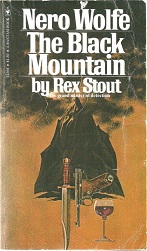
I was therefore delighted to come across The Black Mountain, a 1954 adventure I had never read and welcomed it, along with the inscrutable Wolfe and the wise-cracking Archie, as one would welcome an old friend to a party – an old friend who always had something interesting to say and who always brought a bottle of something decent to drink. This particular Wolfe adventure is also a rarity, for not only does the oversize detective actually leave his office, but he leaves New York and travels to his native Montenegro. And for a detective genius there’s something rather endearing (and typically American) when he realises that to take on this very personal case back in his native land, he has to apply to get a passport!
|
Despite the severe physical hardship of having to travel way out of his comfort zone and hike around the mountains on the Montenegro/Albania border with hardly a morsel of food and no beer to sustain him, Wolfe retains his fierce sense of justice. When he finally uncovers the murderer of one of his best friends, loyal side-kick Archie Goodwin suggests summary and lethal justice, but Wolfe refuses, railing: “That was the doctrine of Hitler, as it is now of Malenkov and Tito and Franco and Senator McCarthy; masquerading as a basis of freedom, it is the oldest and toughest of the enemies of freedom.”

Although Rex Stout is well-remembered and honoured in his native land, I fear that his reputation – and that of Nero Wolfe, often called ‘the American Sherlock’ – in Britain is slipping into shadow. I do not think UK editions of his clever, literate, liberal and often very funny books have existed for some years, but thanks to the wonders of the jolly old interweb many American paperbacks (and now Kindle eBooks) are easily available at the click of a mouse. Just what Rex Stout or Nero Wolfe would have made of the phrase ‘click of a mouse’ is anyone’s guess.
Writers Revealed
For the last two years I have enjoyed, and recommended to anyone who would listen, the ‘Inspector Pekkala’ thrillers set in 1920s and 30s Russia, written by ‘Sam Eastland’. In fact I think I chose the first, Eye of the Red Tsar, as my choice 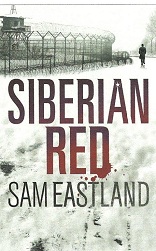 for best first novel in the annual Shots Awards, although not quite believing that such an accomplished thriller was actually by a debut author. for best first novel in the annual Shots Awards, although not quite believing that such an accomplished thriller was actually by a debut author.
In February next year, the third in the series, Siberian Red is published by those Fabulous Faber people and finds Pekkala, who started his fictional life as an investigator for Tsar Nicholas II during WWI, is now working for another Tsar, Stalin, just as WWII breaks out.
That the ‘Sam Eastland’ books should be so accomplished – not only well-researched but very well-written – no longer surprises me now that I have discovered that behind the pen-name lurks Paul Watkins who has been turning out varied but always excellent novels for twenty years or more.
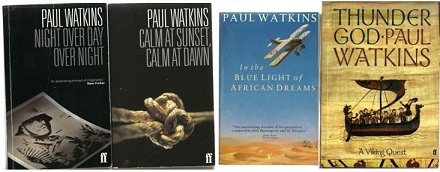
Although arguably not thrillers in the conventional sense, Watkins’ books are certainly thrilling and Calm At Sunset, Calm At Dawn (written at some appallingly young age like about 25) is one of most gripping and exciting, as well as thoughtful and atmospheric, contemporary stories about small fishing boats off the New England coast I have ever read. (Okay, I admit, it’s probably the only one I’ve read, but it’s still a jolly fine piece of writing.)
I can also reveal that Daniel Blake, author of the New Orleans-set serial-killer thriller City of Sins from HarperCollins, is none other than Boris Starling who, back in 1999, gave us the London-set serial-killer thriller Messiah which was made into a television series starring the always-impressive Ken Stott, and which had very little to do with George Frederic Handel.

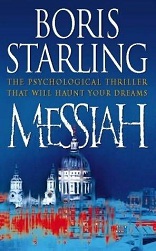
Medical Certificate
Owing to a series of medical misfortunes, for which a doctor’s certificate was presented, I was unable to attend the launch of Deryn Lake’s new novel Death at the Wedding Feast, at that most fashionable of venues, Goldsboro Books in London’s Cecil Court. As Deryn is the undisputed Queen of the Georgian mystery, invitations to the party observed all the correct formalities, informing guests not just of the commencement time but also, for their convenience, the concluding times as follows: “Sedan Chairs at 8.00 p.m.; Carriages at 8.30 p.m.; Hearses at 9.00 p.m.”
Striking a Light
One party at Goldsboro Books I should be able to attend, however, will be that to launch Bryant & May and the 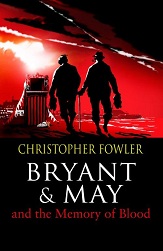 Memory of Blood by the multi-talented Christopher Fowler and published by Doubleday. Naturally (the clue is in the title), this features two of my favourite old codgers, detectives who have raised quirkiness to an Olympic sport, Arthur Bryant and John May, in what I believe will be their ninth adventure which involves automata, stagecraft and, as usual, some very peculiar crimes. Memory of Blood by the multi-talented Christopher Fowler and published by Doubleday. Naturally (the clue is in the title), this features two of my favourite old codgers, detectives who have raised quirkiness to an Olympic sport, Arthur Bryant and John May, in what I believe will be their ninth adventure which involves automata, stagecraft and, as usual, some very peculiar crimes.
But don’t be fooled. Among the quite delicious lunacy, Fowler is a clever enough writer to slip in some lovely observational nuggets of wisdom, such as this rumination by Arthur Bryant: ‘The true mark of English conversation is not being able to tell when you’ve been insulted.’ Indeed that could be adopted as the motto for many a reviewer of crime fiction.
Crazy Name, Crazy Guy
I thoroughly enjoyed – and I know that distinguished reviewer Lee Child did too – The Black Monastery by my fellow boulevardier, the flamboyantly named Stav Sherez and I had no hesitation in naming it one of the best thrillers of 2009.
Now I hear that those Fabulous Faber publishers are launching his new novel on to an unsuspecting world in February 2012. A Dark Redemption is a new departure for Stav as I believe it marks his move into ‘police procedurals’ and it looks as if it will be the first in an on-going series featuring a London detective duo, Detective Inspector Jack Carrigan and Detective Sergeant Geneva Miller.
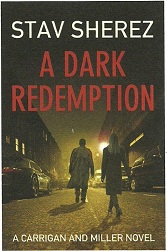
Carrigan and Miller be London’s answer to Dalziel and Pascoe, Harpur and Iles, or even Morse and Lewis? We’ll have to see, but I have a feeling it might be fun finding out.
The Awards Season
Last year I gave vent to my astonishment that Deon Meyer’s 13 Hours had not won a crime writing award in this country and only last month I was equally amazed that Reginald Hill and Canadian diva Louise Penny were not even in contention this year as the awards season is now upon us (climaxing in December with our very own Shots of the Year).
Fortunately, wiser heads prevail across the Atlantic. I hear from this year’s Bouchercon in St Louis, where Shots has several correspondents embedded in the bar that 13 Hours has actually won a Barry Award for Best Thriller while the ‘Best British’ Barry went to Reg Hill for The Woodcutter. In addition, Louise Penny has scooped yet another Macavity Award and an Anthony Award, named in honour of critic and crime writer Anthony Boucher, for Bury Your Dead, to add to her groaning cabinet of statuettes.
Bouchercon also saw the annual awards of the Private Eye Writers of America and The Eye award for lifetime achievement went, I am delighted to say, to that statesman of, and ambassador for, American mysterydom Ed Gorman who has had the misfortune to be my editor in various anthologies and magazines in days gone by.
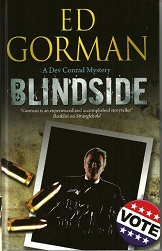 Ed Gorman is a prolific author in the mystery, western and horror fields in his own right, as well as being a fine ambassador for the crime/thriller genre as a whole yet his work is relatively little known in this country. It is therefore with impeccable timing to coincide with his Lifetime Achievement recognition, that those eminently civilised publishers Severn House release his latest thriller Blindside. Ed Gorman is a prolific author in the mystery, western and horror fields in his own right, as well as being a fine ambassador for the crime/thriller genre as a whole yet his work is relatively little known in this country. It is therefore with impeccable timing to coincide with his Lifetime Achievement recognition, that those eminently civilised publishers Severn House release his latest thriller Blindside.
This, I believe, is the third in a series to feature Dev Conrad, a political fixer currently helping with the Congressional re-election of a politician with dangerously liberal views – or at least dangerously liberal as far as some of his down-home and heavily-armed Illinois constituents are concerned. As our hero Conrad notes ruefully: I always feel right at home when a large number of people at a political rally are carrying guns and assault weapons.
Double Take
Somebody somewhere with a degree in publishing has researched the amount of time it takes for the cover of a paperback on a bookshop shelf to register with the eye of a browsing purchaser and the figure is ridiculously small; something like 3.8 seconds. I may have that figure wrong, but I’ve seen a thirsty nun down a pint of Guinness is less time.
Pity, then, the unsuspecting browser looking for the latest conspiracy/quest/myth/antiquarian adventure thriller based around an ancient artefact. Should they go for The Relic by Tom Egeland from John Murray, or The Death Relic by Chris Kuzneski from Penguin?

Of course they are both significantly different. One has 418 pages and the other 502, though one costs £1 more than the other. The Death Relic is set in the Mayan ruins of Yucatan whilst The Relic favours the Biblical Middle East and Norway. Why Norway? Because Tom Egeland is Norwegian and The Relic has been described as “The Norwegian Da Vinci Code”.
Enough said, I think.
Reader, I Wrote It
Regular readers of this column will know that I am not one to indulge in ‘name dropping’ – or at least not gratuitously – but when P.D. James and I were guests at the launching of the 2007 Essex Book Festival, she did confide to me that she had just finished one novel (which was to become The Private Patient) and was planning another, different story, before returning to her famous detective Adam Dalgliesh.
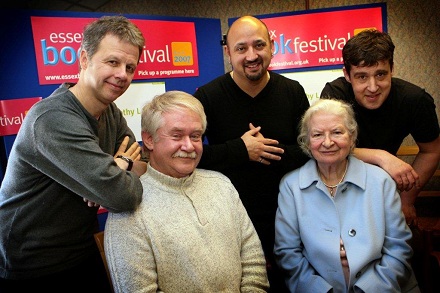
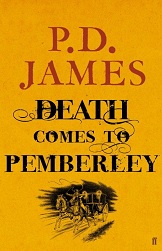 Now details of that other, ‘different’ story have emerged from Baroness James’ publishers Faber and it sounds an absolute corker, as Death Comes To Pemberley, to be published in early November, is nothing less than a sequel to Pride and Prejudice with added murder and mystery, set in 1803 with Darcy and Elizabeth happily married for six years when a case of murder turns up literally on Pemberley’s doorstep – or should than be driveway? Now details of that other, ‘different’ story have emerged from Baroness James’ publishers Faber and it sounds an absolute corker, as Death Comes To Pemberley, to be published in early November, is nothing less than a sequel to Pride and Prejudice with added murder and mystery, set in 1803 with Darcy and Elizabeth happily married for six years when a case of murder turns up literally on Pemberley’s doorstep – or should than be driveway?
The combination of Jane Austen and P.D. James (a lifelong Austen fan) is surely going to be a winner and I suspect that someone in the BBC’s period drama department is already dusting down their stock of bonnets and checking Colin Firth’s diary.
Mystery Men
For much of the early part of Nine Inches I was sure that Colin Bateman’s original journalist hero Dan Starkey was morphing into his more recent leading character, the anonymous ‘Mystery Man’ who runs a crime fiction bookshop in Belfast whilst moonlighting very inefficiently as a sort of investigator, but not quite a private detective.
Dan Starkey is of course Bateman’s fearless investigative journalist, whom we first met in his debut thriller Divorcing Jack (with its iconic cover) back in 1995. Now no longer a journalist, Starkey haunts the fleshpots of Belfast whilst moonlighting very inefficiently as a sort of investigator, but not quite a private detective.....
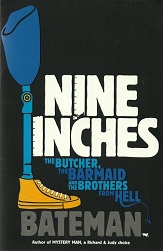
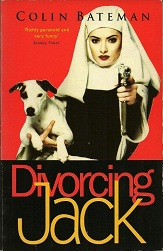
There are other very scary similarities between Mystery Man – a paranoid, anally-retentive, hypochondriac solidly double-parked on the wrong side of Aspergers Street – and Starkey, not the least of which is their fondness for proprietary brands of confectionary. Apart from one character actually being called Jack Caramac, there are lots (and I mean lots) of references to Twix, Crunchies, Kit-Kats and Mars Bars and just when you think the sugar rush has died down, our hero moves on to Hob Nobs and Jaffa Cakes and everything (even a meal in a fancy restaurant) is washed down with copious amounts of Coca-Cola or Diet Coke. One gets the feeling that the most lucrative (legal) profession in Belfast must be dentistry and at times you feel like screaming at him to man up, stop scoffing the sweeties and have a cigarette!
Like Mystery Man, though without the alibi of being several new pence short of a shilling, Starkey is outrageously rude to just about everyone he meets, including the women who all find him sexually desirable (must be the chocolate), which I would have thought in Belfast would lead to him getting beaten up quite often. It no surprise then to find that Starkey does get beaten up...then burned with a cigarette, then beaten up again and then blown up; this is after all Belfast, where the gangsters make the Kray twins look like social workers and some of the policemen do too.
Once Nine Inches gets going though (and the title does not refer to what you’re thinking) it turns into a dark, violent urban thriller drawing on the legacy of ‘The Troubles’ which left paramilitary gangs, still well-armed, in charge of the streets with barely a squeak of protest from an impotent police force and corrupt politicians. There are some politically incorrect trademark Bateman jokes, the best of them done in the worst possible taste, appalling acts of random and callous violence, and a genuine sense of menace, suspense and tension as Starkey, more by dumb luck than any great detective work, engineers a violent conclusion to sort out the bad guys and (accidentally) dispose of a major stash of coke (the drug not the soft drink this time) and a rather large amount of drug money. Aiding and abetting him among a splendid supporting cast of the weird and wonderful are a feral one-legged teenager and a wonderfully lugubrious vegetarian butcher with a bloodstained past in more than one sense.
One can forgive Bateman’s Mystery Man creation an awful lot because he is clearly, from the off, damaged goods who simply can’t handle society or normal life; plus, his opinions on crime fiction, particularly Scandinavian crime fiction, are priceless. The badly behaved Dan Starkey, though, is an eminently slappable character, and one can only wonder why, in a fairly small city, there is still anyone left who will speak to him without shooting first.
Tinker, Tailor, Soldier, Angel
Under Moscow Rules I am, of course, never likely to attend the annual crime convention held at St Hilda’s College, Oxford but it does appear that one of my books was smuggled into the college grounds this year. The unsuspecting academic who clearly found the book on the manicured lawns and idly inspected it was unknowingly filmed by the college’s security cameras. I am sure he is completely innocent of any crime.
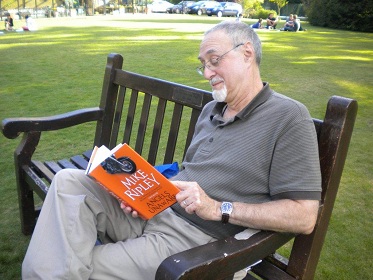
Pip! Pip!
The Ripster
|